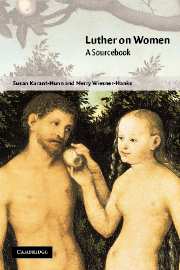4 - Biblical women other than Eve and Mary
Published online by Cambridge University Press: 05 June 2012
Summary
Both the Old and New Testaments abound with examples of individual women who play major roles in the history of the Jewish people, the life of Christ, and the first-century community of believers. Luther writes extensively and specifically about these women in his Biblical commentaries and lectures, speaks about them in sermons, mentions them in the table talk, and refers to them in his letters. He often uses the examples of Biblical women to make general points about God's commandments to female and male believers, and also as springboards for hostile comments about the papacy, Jews, or other individuals and groups he opposed.
As with his ideas on other subjects, Luther says so much about Biblical women that he sometimes contradicts himself. This emerges most clearly in his discussions of women's preaching or prophesying. When he is writing in opposition to Catholic notions of the priesthood, he uses the examples of women's prophesying in the Old and New Testaments as a sign that the office of the priesthood has been extended to all believers. When he is writing in opposition to those who took this statement literally and calls for an end to an ordained ministry, he terms women's preaching, like that of untrained men, as equal to that of children, fools, drunks, and the mute.
His strongest statements for and against women's preaching or other public religious actions emerge in the middle of polemics directed against those with whom he disagreed.
- Type
- Chapter
- Information
- Luther on WomenA Sourcebook, pp. 58 - 87Publisher: Cambridge University PressPrint publication year: 2003

